'You see kids arriving, so many of them orphans': Cork convoy shaken by scenes at border
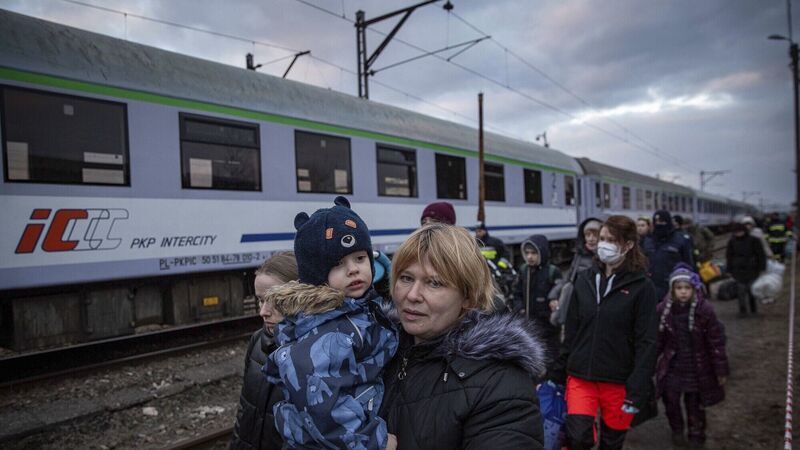
Family members accompany disabled Ukrainian children, evacuated by doctors of the Central Clinical Hospital (MSWIA) from Warsaw in a special train heading for Gdansk, near the border crossing in Medyka. Picture: AP Photo/Visar Kryeziu)
In the fortnight since Russia invaded Ukraine, an entire village has grown around the Medyka crossing on the Polish border, with hundreds of volunteers greeting refugees as they come through immigration.
Rows of tents line the makeshift avenue from the border gates, and volunteers greet people as they arrive, offering hot food of every type to Ukrainians who look slightly dazed.
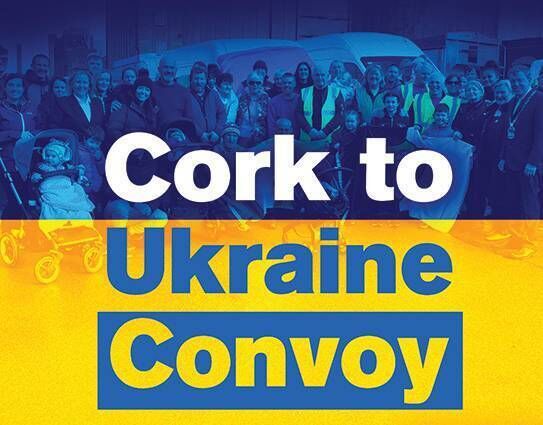
Valentina, a slim, elegant woman in her thirties, is from Kyiv, and she speaks in flawless English without a trace of an accent. When I say I’m a reporter from Cork, and begin to say where that is, she replies with a slight smile that of course she knows where Cork is, and she likes Ireland.
For the past two weeks, she says, she and her three-year-old daughter have been in hiding about100 kilometres from the city, but now the Russian bombardment has forced them to flee.
“My parents stayed in Kyiv because they have many dogs and cats and they can’t leave them. I don’t know how safe they are.
Valentina has travelled today with her sister-in-law Ilina and her four-year-old son. She says the Polish people they have met today have all been extremely welcoming, but she says they don’t intend to stay if they can avoid it.
“We hope it will be over soon, and we hope we can go home.
Valentina has a cool, calm demeanour, but she suddenly looks close to tears when she asks: “Have you heard about what happened in Mariupol? They bombed a mosque with children inside. Also, they bombed a maternity hospital. Who could do such a thing? How could you do that?
"How could you bomb a maternity hospital? How could you kill children?”
She and her daughter lead her sister-in-law and the little boy away toward the buses which will bring them further into Poland.
As they go, Valentina is stopped by a young Polish soldier who briskly, but in a friendly tone, asks in English if I had been bothering her. She says I was not, and he relaxes a little. She offers a bleak nod as she and her family leave.
By the buses, young men are making balloon animals for the children heading to safety in Poland, something which two members of Cork City Missing Persons Search and Recovery (CCMPSAR), taking a break as their vans queue for the border crossing, find extremely moving.
“You really see the best of people and the worst of people in this place,” Chris O’Donovan, CCMPSAR treasurer, says.
CCMPSAR secretary Dave Varian says he finds it hard to imagine what would drive someone to do such a thing.
“You see the kids arriving here, so many of them orphans, and you see women walking in with all their possessions in plastic bags, my God, it’s just soul-destroying,” he says.
Not far from the buses, young Polish volunteers pick through mountains of clothing, all donated but much of it useless. Karolina Potrebska says they are doing essential work that no-one else wants to do.
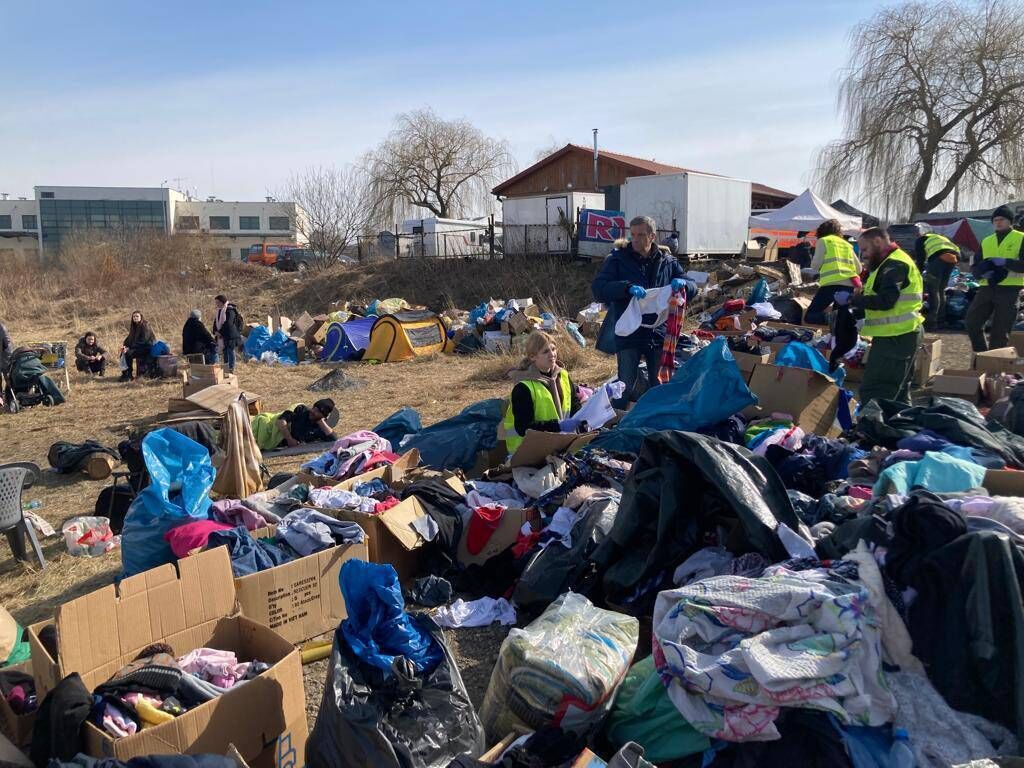
“Most of this is rubbish. People mean well, but this is not helping us. There is some good clothing here, but people leave it out and then it snows on top of it. We are cleaning up trash, too, because there is nobody supplying vital services, and there is a lot of food waste, and cardboard as well.
“So we are trying to do our best, but it is not easy,” she says.
A pair of tents are decorated with signs saying “Siobhan’s Trust” draws our attention. A young Scottish man called Harry Scrymgeour says Siobhan was his mum, and she passed away three years ago.
“Mum always did a lot of good work with inner-city kids in Dundee, so we wanted to do this in her name,” he says. “We fundraised in Mum’s name, and we raised £100,000, so we came out here with gazebos and basic cooking utensils and we’re open 24/7.
Next to Siobhan’s Trust is a bus belonging to the Sikh Holocaust Museum, and behind it is a Snapper-style van marked “United Sikhs”. Balwant Singh, from Seattle, and Rob Anker, originally from Stalybridge outside Manchester, are handing out tubs of chickpea curry and rice, and I can tell you with honesty it is the nicest vegetarian curry I have ever tasted.
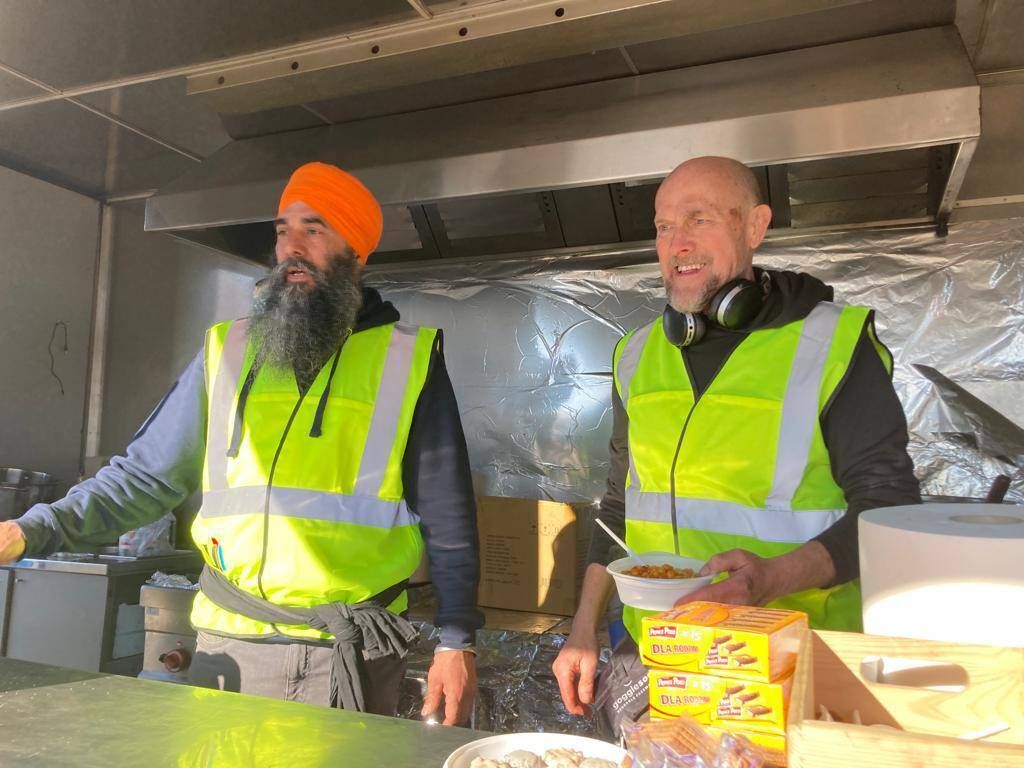
“We’re open 24/7, and sometimes we don’t get time to sleep,” Rob says.
“And sometimes we forget to sleep,” Balwant says with a laugh. “But a lot of time people do like to travel at night, so it is convenient for them that we are here all night. It gets very busy between ten at night and two in the morning, and it’s good we’re there for them.”
A woman is handing out small bags of fruit to the families leaving the immigration centre, and she has a familiar accent. Her name is Bernie Butler, and she is from Waterford originally, but lives in London. She and her friend Jo Strutt-Nicholls were volunteering in a Polish charity which was inundated with donations, so they decided to come to Medyka to help.
“The people we’ve met here are all amazing, and for us this experience has been a real honour,” she says.
Henry Benach is a pastor from North Georgia in the United States, and he says he is a Chistian but also a Jew. When I point out Jesus was technically a Christian Jew too, he grins and says “You got it, brother”.
Henry says he is quarter Ukrainian, quarter Belarussian and half Hungarian, but his wife is “One hundred percent Ukrainian, her whole family is from Dnipro, which Putin has just started bombing”.
He says there is a lot of humanitarian aid in Medyka, and he and his wife are there to provide spiritual aid. His first wife, who died from cancer, was Irish, McAlary from Dublin, and he jokes that his dog was born on St Patrick’s Day.
He hopes to travel to Ireland someday, and in the meantime, he says, he will continue to look to the Good Book.
“Purim is on Wednesday, the 16 of March, it’s mentioned in the Book of Esther, the only chapter in the Bible not to mention God, but God’s handwriting is on every page,” he says.
“Purim is the Jewish feast of Deliverance, and deliverance is what we’re praying to the Good Lord for the people of Ukraine at this bitter time.”

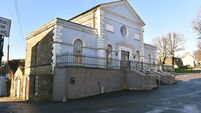





 App?
App?


